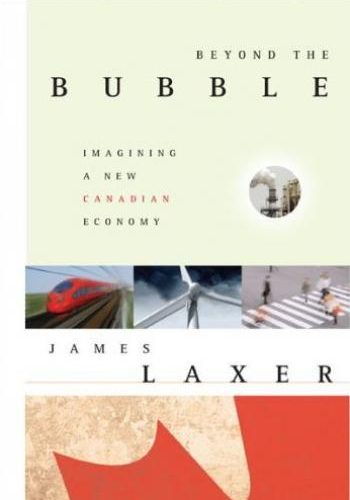“The neo-liberal system has fallen into pieces and cannot be put together again. Nor should humanity attempt it. It is time to move on to a better future.” These are the last words in James Laxer’s Beyond the Bubble. The rest of the book fills in the details of what amounts to a very interesting read for economists and non-economists alike.
“The neo-liberal system has fallen into pieces and cannot be put together again. Nor should humanity attempt it. It is time to move on to a better future.” These are the last words in James Laxer’s Beyond the Bubble. The rest of the book fills in the details of what amounts to a very interesting read for economists and non-economists alike.
This is a book of many stories. Nominally, it’s about a bubble that popped over the housing market. Laxer could have chosen other bubbles – the dot-com crash, the Great Depression – but they may have offered less rhetorical value today.
Our tale begins in the US, a country where the top 300,000 earners make almost as much as the bottom 150 million, and home ownership is promoted because homeowners are more likely to vote Republican. The US is in serious economic trouble, and has gone from being the largest creditor nation to the largest debtor in the world. Even scarier, market mechanisms are encouraging this economic free fall. For example, China and Japan are forced to buy US securities to keep Americans consuming Chinese and Japanese products, thereby pushing the country even further into debt.
According to Laxer, America’s woes began when they abandoned a Keynesian economic model, which balanced labour, capital and national autonomy, for a neo-liberal one, where capital is supreme, globalization provides cheap and “flexible” labour, and national autonomy is a dirty joke told over cocktails. Laxer sums it up with the concluding argument of the first section: the age of US supremacy is over and world power is shifting East.
From the story of a weakened America, Laxer points his telescope home. He describes how Canada’s power brokers are wedded to the idea of exporting raw materials to the US, how our public companies are privatized with disastrous results, and how our unions are undermined because they get in the way of “efficiency.” It’s a country where a finance minister can claim with a straight face that Canada will not run a deficit and then revise the budget several months later to predict a whopping $50-billion shortfall. More frightening, according to Laxer, is that neither Jim Flaherty nor Stephen Harper saw the fall coming. Why, you might ask? They bought part and parcel into the neo-liberal model. Yeesh.
Fortunately, there is still hope. In the book’s last few chapters, Laxer outlines his vision of a new Canadian economy. First and foremost, we would value labour over capital, realizing that labour is the true source of wealth. A better Canada would be both more “Canadian,” by exerting more national control within its boundaries, and more “international,” by recognizing that the world extends beyond the Canada-US border. Laxer cautions against the ultra-nationalism that has swept into some parts of the world, and calls for a return to the kind of progressive thinking often characterized by social democrats and environmentalists.
Beyond the Bubble will make you angry that so much inequality, short-sightedness and greed exists in your own backyard, and frustrated that economics seems to have no moral compass. Most readers will find themselves yearning for the kind of future that Laxer envisions, while recognizing that he hasn’t provided a complete road map.
Beyond the Bubble: Imagining a New Canadian Economy, James Laxer, Toronto: Between the Lines Press, 2009, 264 pages
This review originally appeared in New Eco Books, Issue 36.3. Subscribe now to get more book reviews in your mailbox!













